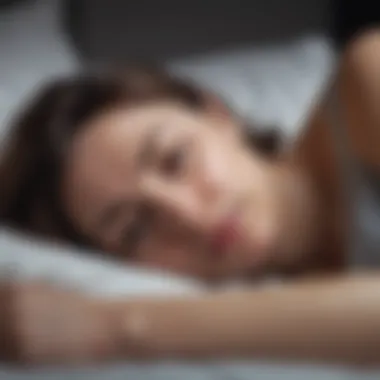Understanding Restless Sleep During Menopause


Summary of Objectives
This article delves into the complex relationship between menopause and restless sleep, aiming to unravel the various factors that contribute to sleep disturbances during this transitional phase in a woman's life. It focuses on both physiological and psychological aspects, analyzing how hormonal changes affect sleep patterns.
Importance of the Research
Highlighting the significance of this research, the examination provides crucial insights for healthcare providers, researchers, and those directly affected by menopause. Understanding the implications of menopausal sleep disorders can lead to more effective treatments and improved sleep quality.
Intro
Restless sleep during menopause is a prevalent issue, impacting many women worldwide. As women undergo this natural phase in life, various changes occur physically and mentally. These changes often contribute to poor sleep quality, leading to fatigue and decreased well-being.
Wide-ranging research has indicated that fluctuations in hormone levels, particularly estrogen and progesterone, can disrupt normal sleep patterns. Understanding this dynamic is essential for fostering better sleep health during menopause.
Researching the connection between menopause and sleep disturbances not only benefits individual well-being but also informs health professionals seeking to enhance patient care. By focusing on the underlying causes of restless sleep, we can explore targeted interventions that may alleviate symptoms and improve overall quality of life.
Results and Discussion
Presentation of Findings
Current studies show that the hormonal changes associated with menopause lead to increased instances of insomnia and restless sleep. Data suggest that women may experience shorter sleep durations, heightened wakefulness, and fragmented sleep cycles. Examining sleep-disordered breathing and other conditions pertinent to this demographic is necessary for understanding the full scope of issues at play.
Additionally, psychological factors such as anxiety and depression can exacerbate sleep disturbances. During menopause, many women report increased emotional stress due to various life transitions, which further complicates sleep recovery.
Implications of Results
The implications of these findings are significant. Improved awareness surrounding restless sleep during menopause can lead to more tailored treatment options. Effective interventions may include hormone replacement therapy, cognitive behavioral therapy, and lifestyle adjustments like improved sleep hygiene and stress management techniques.
"Proper sleep is vital for cognitive function, emotional regulation, and physical health. Understanding how menopause affects sleep quality equips both patients and providers to navigate this challenge."
Foreword to Menopause and Sleep Disturbances
Menopause is a significant phase in a woman's life, marking the end of her reproductive years. The transition often brings various changes in both physical and mental health. Among these changes, sleep disturbances stand out as a notable concern for many. Understanding the factors behind restless sleep during this time is crucial. This article intends to delve into the nature of these disturbances, focusing on how menopause alters sleep patterns.
Given the importance of restful sleep for overall health, exploring this topic provides insights that can benefit many. Women experiencing menopause often face insomnia, night sweats, and general restlessness, all of which can severely impact their quality of life. Consequently, grasping the connection between menopause and sleep disorders can help in formulating effective strategies for better sleep.
Definition and Phases of Menopause
Menopause occurs when a woman has not had her menstrual period for 12 consecutive months. It generally takes place between the ages of 45 and 55, although it can vary significantly. Menopause is divided into three main phases: perimenopause, menopause, and postmenopause.
- Perimenopause: This phase can start several years before menopause. It involves hormonal fluctuations that may result in irregular periods, mood swings, and sleep issues.
- Menopause: The actual transition marked by the absence of menstruation. Hormonal levels decline, which affects various body systems, including sleep regulation.
- Postmenopause: The phase following menopause, where symptoms may continue, but hormonal levels stabilize, leading to potential long-term changes in sleep patterns.
Overview of Sleep Patterns in Adults
Sleep is essential for well-being and health. Adult sleep patterns generally include cycles of light and deep sleep, including REM sleep, which contribute to restorative processes. During menopause, these patterns can become disrupted.
Some of the main points to consider include:
- Sleep Architecture: The distribution of sleep stages can change. Women may experience less deep sleep and more fragmented sleep.
- Sleep Duration: Many adults, particularly women in menopause, report a decrease in total sleep duration, impacting their functioning during the day.
- Circadian Rhythms: Hormonal changes can also influence natural sleep-wake cycles, leading to difficulty falling asleep or remaining asleep.
Understanding these patterns is crucial for identifying and addressing sleep difficulties related to menopause.
Physiological Impacts of Menopause on Sleep
Understanding the physiological impacts of menopause on sleep is crucial for recognizing how this natural life stage affects women's overall sleep quality. Menopause marks a significant transitional phase characterized by hormonal fluctuations. These fluctuations are not merely biological; they have profound implications for sleep. Numerous studies indicate that sleep disturbances during menopause may stem from various physiological changes that require attention from both researchers and health practitioners.
Hormonal Changes During Menopause
Hormonal changes play a pivotal role during menopause. The two primary hormones involved are estrogen and progesterone. As women progress towards menopause, the body produces decreasing amounts of these hormones. Estrogen is known to regulate the sleep-wake cycle. Its decline can lead to difficulties in falling asleep and maintaining deep sleep. Similarly, progesterone, which often has a calming effect on the body, also diminishes during this period.
These changes can result in increased incidence of night sweats and hot flashes, further disrupting the sleep pattern. For many women, the reduction in these hormones equates to not just physical discomfort but also exhaustion and restlessness at night.


"Understanding hormonal shifts during menopause is essential to address effective sleep management strategies."
Effects of Estrogen on Sleep Quality
The relationship between estrogen levels and sleep quality is well documented. Estrogen influences various neurotransmitters involved in sleep regulation. During menopause, as estrogen levels dwindle, women often report experiencing fragmented sleep. Research suggests that lower estrogen can lead to increased rapid eye movement sleep (REM) disturbances, which may cause women to wake more frequently throughout the night.
Additionally, lower estrogen can exacerbate common insomnia symptoms. Women may find it challenging to stay asleep for extended periods due to anxiety and stress, both of which can increase during menopause. These circadian rhythm disruptions reveal the crucial role that estrogen plays in maintaining sleep continuity and quality.
Impact of Progesterone Withdrawal
Progesterone withdrawal adds another layer of complexity to sleep during menopause. This hormone typically acts as a natural sedative. Its decrease can lead to insomnia and increased irritability. Women may find that falling asleep becomes a challenge, leading to both mental and physical fatigue.
Moreover, progesterone deficiency has been linked to sleep apnea risk rising among menopausal women. This highlights a significant health concern, as untreated sleep apnea can lead to more severe health issues. Addressing the impacts of progesterone withdrawal is therefore essential in finding effective solutions to combat restlessness during this crucial phase in women's lives.
In summary, the physiological impacts of menopause on sleep stem mainly from hormonal shifts that disrupt the natural sleep cycle. Recognizing these changes can help in developing targeted strategies for management and improvement.
Psychological Aspects of Sleep Disruption
Understanding the psychological aspects of sleep disruption is crucial when considering the multifaceted relationship between menopause and restless sleep. Sleep is not merely a physical state; it’s deeply intertwined with emotional well-being. For many women navigating menopause, psychological factors significantly contribute to their experience of sleep disturbances. Stress, anxiety, and mood fluctuations can create a cycle where poor sleep further exacerbates psychological issues, making it vital to dissect this relationship.
Anxiety and Stress Correlation
Anxiety often spikes during menopause, triggered by hormonal fluctuations and life transitions. The increase in anxiety can lead to various sleep issues, such as difficulty falling asleep and staying asleep.
Women might experience night sweats or hot flashes, which can intensify feelings of anxiety. This situation can create a feedback loop. As anxiety rises, sleep quality diminishes, leading to even greater stress levels in waking hours.
Some studies suggest that elevated stress and anxiety levels can activate the sympathetic nervous system, which increases heart rate and alertness, making the body less prepared for sleep. This constant state of alertness can hinder the body's ability to transition into a restful state. In addressing these concerns, it is vital for healthcare providers to include psychological support as part of menopause management.
- Emotional support from therapists or support groups can be valuable.
- Practicing mindfulness or relaxation techniques may help lower anxiety levels.
"Managing stress and anxiety is not just a psychological need but a physical one as well during menopause."
Depressive Symptoms and Restlessness
Depression also plays a crucial role in how women experience sleep disruptions during menopause. Hormonal changes can trigger or worsen depressive symptoms in some women. These symptoms can manifest as persistent sadness, lack of interest, or irritability. Such feelings can interfere with sleep hygiene and routine.
Restlessness often accompanies depression, making it hard for individuals to find a comfortable sleeping position or relax their minds.
This interplay between depression and sleep becomes more complex when considering that:
- Sleep deprivation can worsen depressive symptoms, creating a vicious cycle.
- Quality of sleep can influence mood stability, where poor sleep leads to mood instability.
- Cognitive Behavioral Therapy (CBT) has shown promise in addressing these issues by helping individuals modify their thoughts and behaviors related to sleep.
To break this cycle, it is important for those experiencing these symptoms to seek help. Whether through therapy, medication, or lifestyle adaptations, understanding the psychological aspects of sleep disruption can lead to more effective treatments.
Recognizing that mental health is a crucial component of overall health can help alleviate some negative impacts during this transitional phase of life.
Common Sleep Disorders Associated with Menopause
The connection between menopause and sleep disturbances cannot be overstated. As women approach menopause, their bodies undergo significant hormonal changes that can disrupt typical sleep patterns. Recognizing common sleep disorders associated with this phase is essential, not only for alleviating symptoms but also for improving overall well-being. Understanding these disorders allows for more informed treatment choices and reinforces the idea that managing sleep health is a critical aspect of menopause care.
Insomnia: Causes and Symptoms
Insomnia is one of the most prevalent sleep disorders affecting menopausal women. This condition can manifest in multiple ways, such as difficulty falling asleep, staying asleep, or waking up too early. The causes of insomnia during menopause are often multifaceted. Hormonal fluctuations, particularly the decline in estrogen and progesterone, can lead to increased night sweats and hot flashes, which disrupt sleep continuity. Stress and anxiety related to life changes during this period can further exacerbate the issue, causing a cycle of inadequate sleep and increased fatigue.
Common symptoms of insomnia include:
- Difficulty concentrating during the day
- Fatigue upon waking
- Irritability or mood swings
- Increased anxiety or depression
Sleep Apnea and Menopausal Women
Sleep apnea is another significant concern for women in menopause. It is characterized by repeated interruptions in breathing during sleep. Research indicates that the incidence of sleep apnea increases in women during and after menopause. This may be due to changes in body composition and fat distribution, particularly around the neck. The symptoms can range from loud snoring to episodes of gasping for air, disrupting the sleep cycle and leading to excessive daytime sleepiness.


Menopausal women are encouraged to observe potential signs of sleep apnea, such as:
- Loud snoring
- Feeling unrested after a full night’s sleep
- Episodes of choking or gasping during sleep
These symptoms should prompt a discussion with a healthcare provider for further evaluation.
Restless Legs Syndrome
Restless Legs Syndrome (RLS) is a condition that causes uncomfortable sensations in the legs, often accompanied by an irresistible urge to move them. This disorder is especially common in menopausal women and can significantly impede sleep quality. The exact cause of RLS is not fully understood, but hormonal changes, particularly the drop in estrogen, are thought to play a role in its onset or exacerbation. Factors such as iron deficiency and nerve damage may also contribute to the development of RLS.
Symptoms of RLS may include:
- Creeping or crawling sensations in the legs
- Discomfort that worsens during inactivity
- Relief from symptoms with movement or stretching
Treatment options for RLS often include lifestyle changes and, in some cases, medications. Overall, awareness of these sleep disorders is critical in addressing the sleep challenges women face during menopause.
Lifestyle Factors and Their Contribution
Lifestyle factors play a critical role in the sleep quality of individuals going through menopause. The experiences of sleep disturbances can significantly vary among women, and various external elements can influence this condition. This section focuses on dietary habits, exercise routines, and the consumption of substances like caffeine and alcohol. All of these factors are essential components that contribute to overall well-being and can modify sleep patterns during menopause.
Dietary Influences on Sleep Quality
Diet can profoundly affect sleep quality. Foods that are consumed can either facilitate restful sleep or create disturbances. For example, a diet high in carbohydrates often leads to quick spikes in blood sugar followed by crashes that may interrupt sleep cycles. On the other hand, incorporating foods rich in magnesium and calcium, such as leafy greens and dairy products, may promote better sleep. Omega-3 fatty acids, found in fish, can also help in improving sleep quality by reducing inflammation and anxiety.
It's also crucial to consider meal timing. Eating large meals or heavy foods too close to bedtime can make it harder to fall asleep. A light snack with a balance of carbohydrates and protein consumes a few hours before bed may enhance sleep onset. Additionally, hydration is vital, but it is best to limit fluid intake right before sleep to reduce nighttime awakenings for bathroom trips.
Exercise and Sleep Improvement
Engaging in regular physical activity is known to improve sleep quality. Exercise can help regulate circadian rhythms, enhance mood, and reduce anxiety, all of which contribute to better sleep. Activities such as brisk walking, swimming, or yoga can promote relaxation and mental clarity, making it easier to fall asleep. However, it is essential to time workouts appropriately. Exercising too close to bedtime can be counterproductive, as it may increase energy levels and body temperature, making it harder to wind down. Completing workouts earlier in the day or at least a few hours before bedtime can yield the best results for improving sleep.
Caffeine and Alcohol Consumption
Caffeine is a well-known stimulant that can interfere with sleep patterns. Many products, such as coffee, tea, and energy drinks, contain caffeine and can disrupt the sleep cycle if consumed in the afternoon or evening. It is advisable for menopausal women experiencing sleep issues to limit or avoid caffeine altogether.
Alcohol, while it may initially induce sleepiness, tends to disrupt sleep continuity. As the body metabolizes alcohol, it can lead to fragmented sleep and more awakenings during the night. Therefore, being mindful of alcohol consumption can significantly enhance sleep quality, particularly in the context of menopause.
Research suggests that by modifying lifestyle factors, such as meal planning, exercise patterns, and substance intake, individuals can mitigate sleep disturbances associated with menopause, thus promoting a more restful sleep experience.
The Role of Sleep Hygiene
Understanding the role of sleep hygiene is crucial, especially during menopause when sleep disturbances are prevalent. Sleep hygiene refers to various practices and habits that are necessary for quality sleep. It becomes increasingly important for menopausal individuals to adopt good sleep hygiene to manage restless sleep. The benefits of establishing a proper sleep hygiene regimen can include improved sleep quality, reduced awakenings during the night, and overall better physical and mental health.
Key elements of sleep hygiene include creating a sleep-friendly environment, maintaining consistent sleep schedules, and avoiding stimulating substances close to bedtime. It is essential to recognize that each of these factors can impact sleep patterns significantly, especially when there are already hormonal fluctuations occurring during menopause.
Considerations regarding sleep hygiene during menopause entail recognizing specific challenges such as hot flashes or night sweats. These challenges can disrupt sleep if not managed properly. Hence, integrating effective sleep hygiene practices can offer support in navigating these issues.
"Good sleep hygiene can serve as a non-invasive way to enhance sleep quality during the menopausal transition."
Establishing a Consistent Sleep Routine
Establishing a consistent sleep routine is one of the most effective strategies for enhancing sleep hygiene. This means going to bed and waking up at the same time every day, including weekends. A regular sleep schedule helps regulate the body's internal clock, promoting better sleep quality.
To create this routine, individuals should:
- Set a specific bedtime and wake-up time.
- Engage in relaxing activities before bedtime, such as reading or meditating.
- Limit screen time as the blue light emitted by devices can hinder melatonin production.
Additionally, being mindful of rest periods during the day can prevent excessive napping, which might interfere with nighttime sleep. Consistency is key—over time, the body can adapt to this schedule, which can improve the overall ease of falling and staying asleep.
Creating an Optimal Sleep Environment
Creating an optimal sleep environment is equally critical in enhancing sleep hygiene. A conducive sleep environment can help minimize disruptions and promote relaxation.


Factors to consider include:
- Temperature: Keeping the bedroom cool can alleviate discomfort from hot flashes.
- Light: Reducing light exposure by using blackout curtains can create an ideal sleeping atmosphere.
- Noise: Using white noise machines or earplugs can help drown out disruptive sounds.
- Mattress and Bedding: Investing in a good-quality mattress and comfortable bedding can greatly influence sleep comfort.
Attention to these elements may not only help improve sleep quality but also enhance the overall experience of rest during the challenging menopausal phase.
Potential Treatments for Sleep Disturbances
Understanding the potential treatments for sleep disturbances is essential for individuals experiencing menopause-related restless sleep. The interplay of hormonal fluctuation and psychological stressors creates a multifaceted challenge that needs comprehensive solutions. Effectively managing these disturbances not only improves sleep quality but also enhances overall well-being. It’s crucial to evaluate various treatment options available, as each presents distinct advantages and considerations for menopausal women.
Hormone Replacement Therapy
Hormone replacement therapy, often abbreviated as HRT, focuses on restoring hormonal balance in women experiencing severe menopausal symptoms. Typically, this involves synthetic or natural hormones like estrogen and progesterone. By addressing hormonal deficits, HRT has demonstrated effectiveness in reducing hot flashes and night sweats that disrupt sleep.
However, there are important factors to consider when opting for HRT. While studies indicate improved sleep quality in many cases, potential risks such as blood clots, stroke, and certain cancers should be carefully reviewed. It is vital to have a thorough discussion with a healthcare provider to assess individual risk versus benefit. Each person’s health history and preferences play a significant role in determining whether HRT is a suitable treatment option.
Cognitive Behavioral Therapy for Insomnia
Cognitive behavioral therapy for insomnia, known as CBT-I, provides a structured, therapeutic approach to sleep challenges. This method emphasizes changing negative thought patterns and behaviors that contribute to insomnia. CBT-I focuses on establishing healthier sleep habits and addressing the underlying psychological factors that influence sleep.
Numerous studies suggest that CBT-I can lead to lasting improvements in sleep quality, thus enhancing daytime functioning. This therapy often involves techniques like sleep restriction and stimulus control, which help clients in finding a better sleep routine. Engaging in CBT-I may be especially valuable for women who are hesitant to use medications or those who prefer non-pharmacological methods of treatment.
Use of Sleep Aids: Benefits and Risks
Sleep aids comprise a diverse range of products, from over-the-counter substances like diphenhydramine to prescription medications such as zolpidem. These aids can offer immediate relief from sleep disturbances, allowing individuals to regain a sense of normalcy. Many sleep aids function by promoting relaxation or helping in achieving deeper sleep stages.
Nevertheless, the use of sleep aids comes with essential caveats. Tolerance can develop over time, meaning users may require higher doses for the same effect. Additionally, withdrawal symptoms can pose challenges for long-term users, making it difficult to cease use. Side effects such as daytime drowsiness or impaired memory also warrant attention. Therefore, it is advisable to use sleep aids under medical supervision and in conjunction with other sleep enhancing strategies.
"Choosing the correct treatment for sleep disturbances must involve an understanding of personal health needs and consultation with healthcare professionals."
By evaluating treatments like HRT, CBT-I, and sleep aids, individuals can make informed decisions about managing their sleep disturbances during menopause. Each option offers different mechanisms of action, which can be tailored to fit the unique experiences of each woman.
Emerging Research on Menopause and Sleep
The intersection of menopause and sleep is a complex area of study. Emerging research aims to elucidate the mechanisms that underlie sleep disturbances during this life transition. Understanding these mechanisms can lead to enhanced treatment options. It may also help in creating targeted interventions that can improve overall quality of life for women experiencing these symptoms.
Recent Findings on Neurobiology of Sleep
Recent studies have delved into the neurobiological changes related to sleep during menopause. Research suggests that hormonal fluctuations significantly impact the brain's regulation of sleep. Specifically, areas of the brain that manage circadian rhythms are affected by decreased estrogen levels. One notable finding is the alteration in melatonin secretion patterns. Melatonin, known as the sleep hormone, may become less effective in promoting restful sleep due to these hormonal changes.
Moreover, the relationship between neurotransmitters such as serotonin and norepinephrine with sleep patterns is being closely examined. Depleted estrogen affects neurotransmitter functions, contributing to mood swings and insomnia. Understanding these neurobiological factors is crucial in developing effective therapies tailored to menopausal women.
Interventions Targeting Sleep Improvement
Several interventions are emerging that target sleep disturbances in menopausal women. These strategies range from lifestyle adjustments to advanced medical treatments. Notably, cognitive behavioral therapy for insomnia has shown promise by addressing thought patterns that hinder restful sleep. Another area of focus is the use of specific dietary supplements, such as magnesium and omega-3 fatty acids, which have been linked to improved sleep quality.
In addition, physical activity is also highlighted as an effective intervention. Exercise not only promotes overall health but can also help align circadian rhythms. Studies indicate that even moderate aerobic exercise can significantly reduce insomnia symptoms.
"Addressing sleep issues during menopause is crucial for overall health and wellbeing. Investing time in research will yield better treatments."
Another approach gaining traction is the potential use of sleep aids with minimal side effects. Options like melatonin supplements and herbal remedies are being investigated for their effectiveness and safety. As research continues, developing a comprehensive approach that includes both behavioral and pharmacological interventions could create a more effective pathway for managing sleep disturbances in menopausal women.
Epilogue
In this article, we have analyzed the intricate relationship between menopause and sleep disturbances, particularly restless sleep. Understanding this connection is essential for several reasons.
First, recognizing the physiological and psychological impacts of menopause on sleep helps individuals and healthcare professionals identify potential risk factors. This awareness is the first step in managing symptoms effectively.
Second, exploring treatment options, such as hormone replacement therapy and cognitive behavioral therapy, illustrates that solutions exist. These options can significantly improve sleep quality and overall well-being for menopausal individuals.
Lastly, the conclusions drawn here emphasize the urgency for ongoing research. As our understanding deepens, new interventions may emerge, tailoring to the unique needs of those undergoing menopause. This journey from awareness to treatment highlights the important need to address sleep disruptions in this phase of life.
Summary of Key Points
- Menopause leads to hormonal changes impacting sleep patterns.
- Psychological factors such as stress and anxiety exacerbate sleep issues.
- Common sleep disorders during menopause include insomnia and sleep apnea.
- Lifestyle changes can improve sleep quality.
- Treatments like hormone replacement therapy and cognitive behavioral therapy show promise.
- New research is vital for developing effective interventions.
Future Directions for Research
Ongoing studies need to delve deeper into the neurobiology of sleep during menopause. Insights into how hormonal shifts alter brain mechanisms will be valuable. Furthermore, there should be a focus on personalized treatment approaches that cater to individual experiences of menopausal symptoms. Understanding how lifestyle modifications interact with hormonal changes offers another promising research avenue. Lastly, investigating long-term effects of various sleep interventions on quality of life will enrich our current knowledge base.















